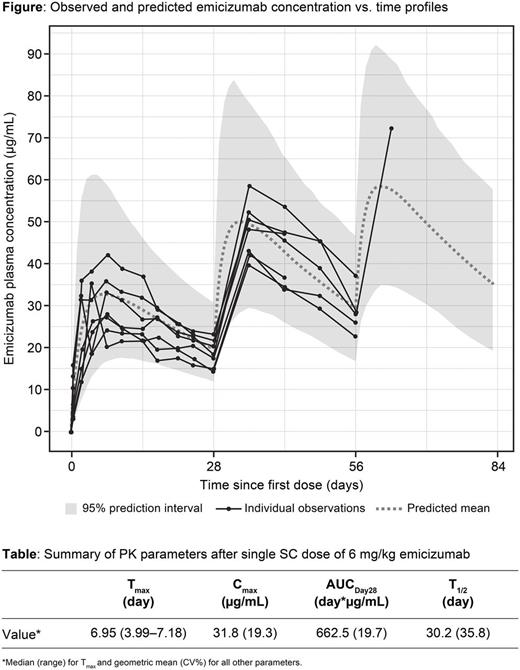Abstract
Introduction
Emicizumab is a novel, subcutaneously (SC) administered, recombinant, humanized, bispecific monoclonal antibody that is under investigation for the prevention of bleeds in persons with hemophilia A (PwHA). Emicizumab restores the function of activated coagulation FVIII, which is deficient in PwHA, by bridging activated FIX and FX to enable effective hemostasis. Due to its mechanism of action, emicizumab is not expected to induce or be affected by anti-FVIII antibodies (inhibitors) and is thus being assessed in PwHA both with and without inhibitors. Once-weekly emicizumab prophylaxis was shown to substantially reduce bleed rates by 87% in PwHA with inhibitors compared with no prophylaxis in the Phase 3 HAVEN 1 study (Oldenburg et al. NEJM 2017; July 10: epub). An interim analysis of the HAVEN 2 study showed that once-weekly emicizumab also prevented or reduced bleeds in pediatric PwHA with inhibitors (<12 years of age) (Young et al. RPTH 2017;1 (S2): Abstract OC 24.1). The ongoing HAVEN 3 study (NCT02847637) will assess emicizumab prophylaxis in PwHA without inhibitors. The ongoing multicenter, open-label, Phase 3 HAVEN 4 study (NCT03020160) is assessing emicizumab administered every 4 weeks (Q4W) to PwHA with and without inhibitors; the study consists of a pharmacokinetic (PK) run-in phase followed by an expansion phase. The objective of the PK run-in phase of HAVEN 4 reported here was to investigate the PK and preliminary efficacy and safety outcomes of an emicizumab dose that was previously not assessed in a phase 1 study.
Methods
Eligible patients in the HAVEN 4 study were aged ≥12 years with congenital hemophilia A with or without inhibitors. In the PK run-in phase, patients must have been receiving episodic (on-demand) treatment with FVIII replacement therapy or bypassing agents with documentation of treatment for ≥24 weeks prior to study entry; the on-study regimen is 6 mg/kg Q4W. The regimen being investigated in the subsequent expansion cohort includes a loading dose of 3 mg/kg SC QW for 4 weeks followed by emicizumab 6 mg/kg Q4W for ≥24 weeks.
Results
At the data cutoff of April 10, 2017, 7 patients with severe hemophilia A had enrolled into the PK run-in cohort - 4 patients without inhibitors and 3 patients with inhibitors, of which 6 patients were aged ≥18 years of age and followed for a minimum of 6 weeks. Individual observed PK profiles were within the 95% prediction interval computed from a population PK model based on clinical data from a 1.5 mg/kg QW regimen (Figure). Emicizumab PK parameters derived after single SC administration of 6 mg/kg emicizumab (Table) were consistent with values observed in previous studies with emicizumab (Uchida et al. Blood 2016; 127 (13):1633-1641). During the observation period (median, 8 weeks), 14 adverse events (AEs) were reported in 5 patients at the time of data cut-off, including 1 Grade 3 serious AE (worsening of hypertension); no AEs were considered related to study drug. No anti-drug antibodies were detected. Also, 6 of 7 patients had no bleeds while receiving Q4W emicizumab; 1 patient experienced 3 spontaneous nose bleeds on Study Days 12, 14 and 21, which did not require treatment.
Conclusions
Preliminary data from the HAVEN 4 study showed that Q4W dosing of emicizumab at 6 mg/kg exhibited a PK behavior that was consistent with prior predictions, leading to an expected steady-state concentration average similar to the clinically confirmed dosing regimen (i.e., 1.5 mg/kg/QW). The safety and efficacy results from this PK run-in cohort enabled the opening of the HAVEN 4 expansion cohort, and provided promising support for a Q4W emicizumab prophylaxis regimen for the management of hemophilia A. The HAVEN 4 study is fully enrolled (N=48, including the PK run-in cohort patients).
Jimenez-Yuste: Roche: Consultancy; Novo Nordisk: Consultancy, Honoraria, Research Funding. Shima: Pfizer: Honoraria, Research Funding; Baxalta: Consultancy, Honoraria, Membership on an entity's Board of Directors or advisory committees, Research Funding; Chugai: Consultancy, Honoraria, Membership on an entity's Board of Directors or advisory committees, Research Funding; CSL: Honoraria, Research Funding; Biogen: Consultancy, Honoraria; Kaketsuken: Honoraria; Novo: Honoraria, Research Funding; Bayer: Honoraria, Research Funding. Fukutake: EPS: Research Funding; Cimic: Research Funding; Sekisui Medical: Consultancy, Honoraria, Speakers Bureau; Roche Diagnostics: Honoraria, Speakers Bureau; Bioverative: Consultancy, Honoraria, Membership on an entity's Board of Directors or advisory committees, Speakers Bureau; Abbott: Honoraria, Speakers Bureau; Kaketsuken: Honoraria; Japan Blood Products Organization: Honoraria, Research Funding; Pharmaceutical Co., Ltd: Speakers Bureau; Bayer: Consultancy, Honoraria, Membership on an entity's Board of Directors or advisory committees, Speakers Bureau; LSI Medience: Consultancy; SRL Inc: Consultancy; Pfizer: Consultancy, Honoraria, Membership on an entity's Board of Directors or advisory committees, Speakers Bureau; Baxalta: Consultancy, Honoraria, Membership on an entity's Board of Directors or advisory committees, Research Funding, Speakers Bureau; Novo Nordisk: Consultancy, Honoraria, Membership on an entity's Board of Directors or advisory committees, Research Funding, Speakers Bureau; Siemens: Speakers Bureau; CSL Behring: Consultancy, Honoraria, Research Funding; Chuugai: Consultancy, Honoraria, Speakers Bureau; Octapharma AG: Honoraria; Torii Pharmaceutical Co., Ltd: Speakers Bureau. Lehle: F. Hoffmann La Roche: Employment. Chebon: F. Hoffmann-La Roche Ltd: Employment. Retout: F. Hoffmann La Roche: Employment. Portron: F. Hoffmann La Roche: Employment. Levy: Genentech, Inc.: Employment.
Author notes
Asterisk with author names denotes non-ASH members.


